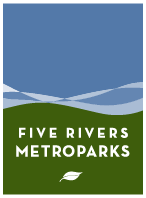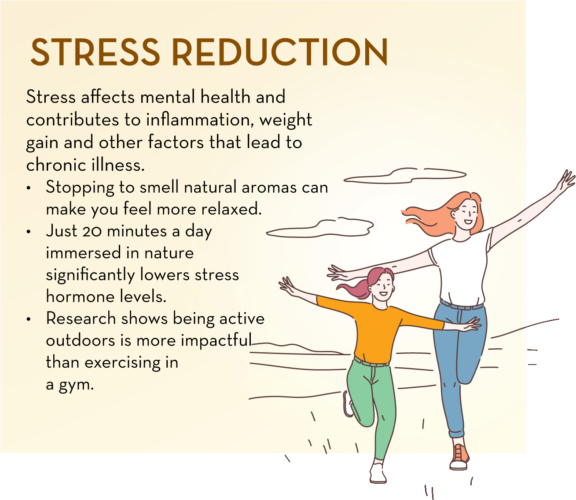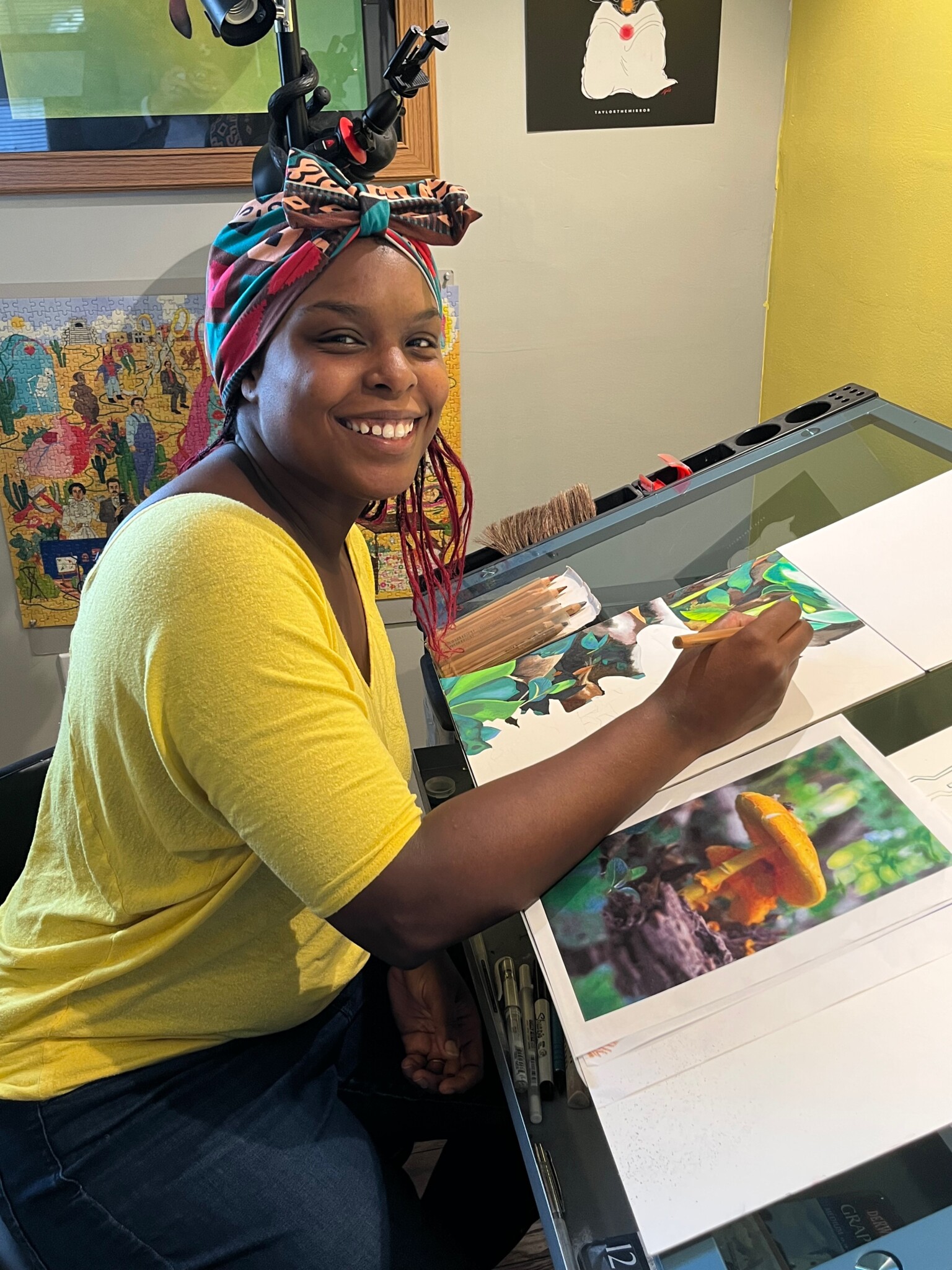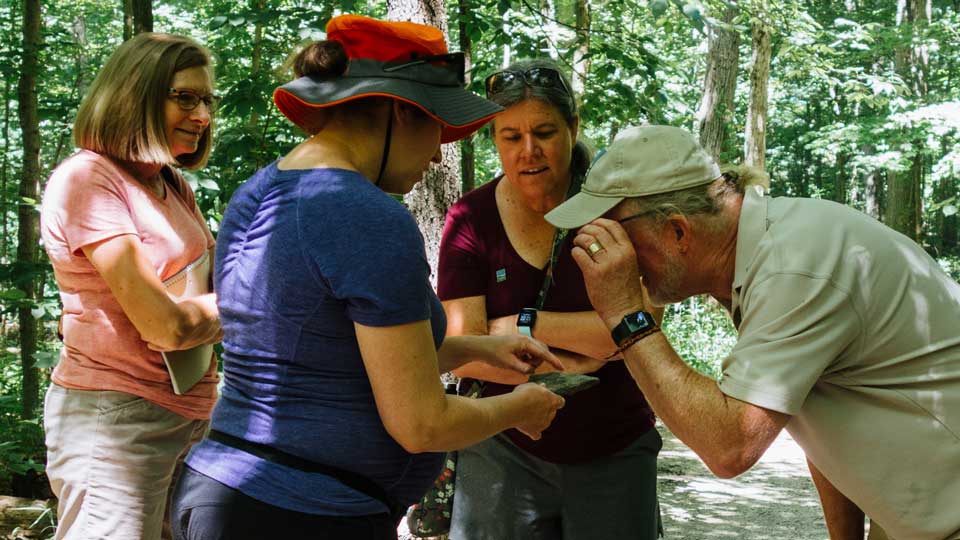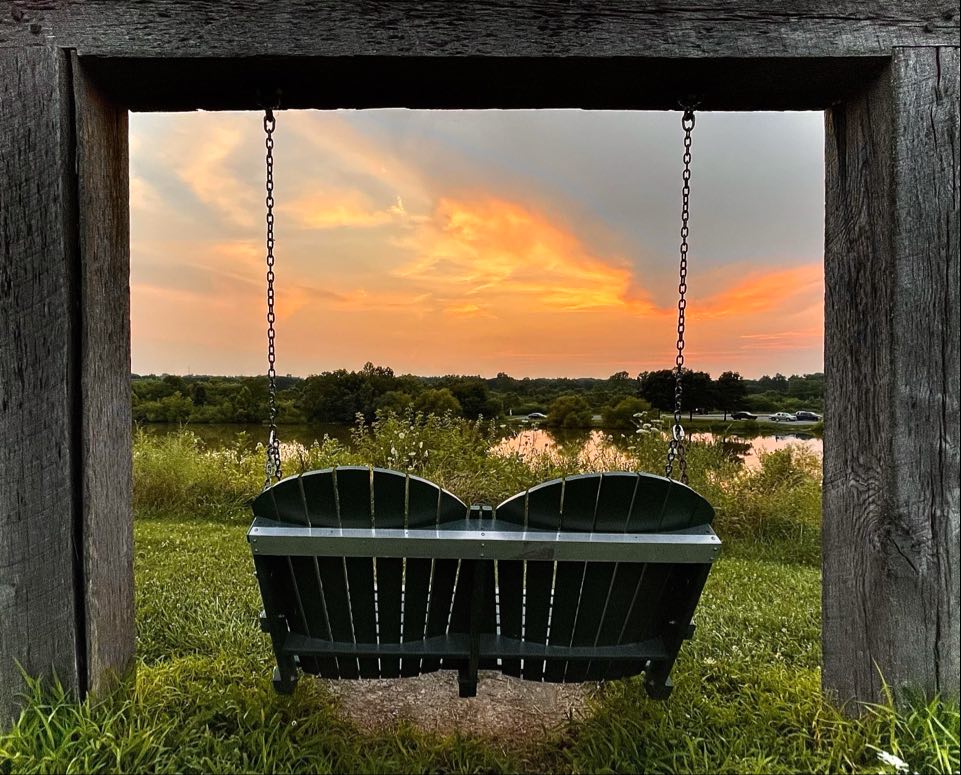Published May 23, 2022
The Healing Effects of Nature
Heads up! This article was published 2 years ago.
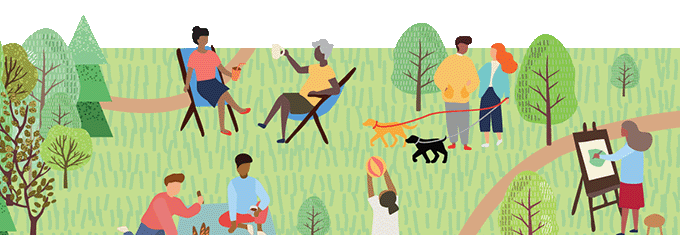
The science behind why spending time outdoors improves your physical and mental health
For millennium, many have understood that time spent in nature improves human health. Take for example Hippocrates, a Greek physician born around the year 460 BC. Traditionally referred to as the “father of medicine,” he’s widely attributed to the quote, “Nature itself if the best physician.”
Park attendance figures at your MetroParks and other parks nationwide show that, since the onset of the pandemic, more and more people have been spending time outdoors, discovering how nature can heal both body and mind.
This comes as no surprise to Scott Hall, University of Dayton professor and clinical mental health counseling program coordinator. Hall teaches a class on ecotherapy, which he said has become “a real hot topic” and, in his private counseling practice, advises clients to spend time in a space they identify as nature.
“You can experience a curative effect by just 20 minutes in nature,” Hall said, adding that filling your life with more nature can be as simple as getting a houseplant — or being aware of nearby parks. “You don’t have to go to these far ends of the world to connect with nature, and that’s a cool thing. There are big trips we can take, but even in a small back yard or park there are everyday things that keep our spirit alive in the eco realm.”
Indeed, a walk around the block or just stepping outside to breathe fresh air counts as time in nature.
“If you have cabin fever, a way to tip the scale is to just go outside. Never underestimate the power of time in nature, and it doesn’t have to involve long activities. We can break up patterns of complacency with micro-moments of being in nature,” Hall said.
“Research really highlights the fact that nature, just by its design, promotes wellbeing in physical, mental, emotional and social health,” he added. “Lot of things are happening in nature we’re not even aware of that encourage our wellbeing.”
Spending time outdoors not only rejuvenates our bodies, but our brains as well. David Strayer is a cognitive psychologist at the University of Utah who studies the mind’s ability to think clearly. His results show time away from our ever-busy and increasingly digital lives — which fatigues our brains — improves creative problem-solving qualitative and conceptual thinking, and sustained attention. Strayer’s hypothesis is time in nature allows the prefrontal cortex, the brain’s command center, to rest and recover, like an overused muscle.
Here are a handful of the many other ways nature makes humans healthier, along with some of the scientific support. And this is far from all the health benefits nature affords: Time outdoors also lowers blood pressure, reduces muscle tension and boosts your immune system. It increases energy levels and improves sleep. It improves aerobic levels and increases blood flow.
Nature Reduces Stress
Studies show that being in green spaces lowers levels of cortisol, the stress-inducing hormone that also contributes to weight gain. The same holds true when people are in what’s known as a “blue environment” near water. And if you’re in a green and blue environment, the positive effects are even more powerful.
“Those two combined really two accelerate lower stress hormones,” Hall said. “Being in nature is not task oriented. You’re not pulled in lot of different directions so your whole nervous system is able to recalibrate.”
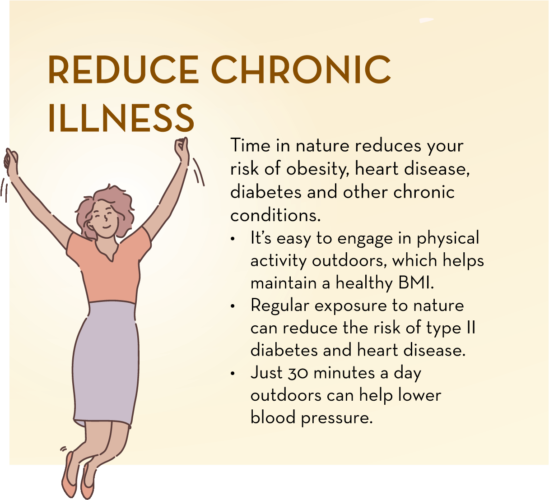
Nature Enhances Creativity
The Theory of Loose Parts, developed by Simon Nicholson in the early 1970s, is one explanation why time outdoors gets creativity flowing. According to this theory, loose parts — materials that can be moved around and tinkered with — create more opportunities for creative engagement than static materials and environments.
Nature, of course, if full of loose parts: the various smells in a field of wildflowers, textures of tree bark, shapes of rocks and leaves, sounds of wildlife.
“Walking through nature forces us to tap into several different senses,” Hall said, noting time in nature also enhances awareness. “If I’m walking down a trail, I have to be mindful of the changing ground and how to shift my energy and balance.”
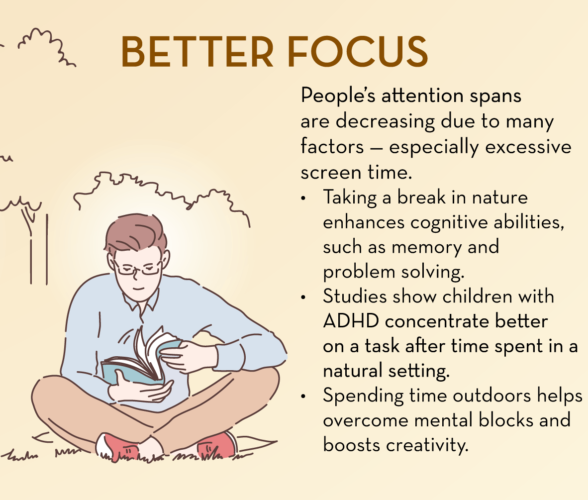
Nature Cultivates Gratitude
Dan Segal’s work focuses on a concept he calls “mindsight” to describe humans’ ability to focus the internal mind, as well as on the self and others. Practicing mindsight helps us positively manage our emotions rather than being overwhelmed by them. And nature, Hall said, is the perfect place to practice mindsight.
“You can practice having a focused gaze and allow your mind to zero in on a particular thing in your environment,” he said. “I may focus on what I hear, listening to the birds or the wind, or focus on what I see, picking up on all the colors, or really notice what I smell. This increased focus strengthens our ability to cultivate our individual sense, and that makes us much more aware as human beings.”
When we’re in nature, Hall added, we automatically appreciate the diversity of nature. Due to the concept transferrable relevancy, that appreciation for nature’s diversity transfers to the real world, helping us likewise appreciate other forms of diversity — which can make us more flexible and result in social benefits.
“We apply what we learn from the natural world to everyday life,” he said. “If we develop that appreciation for the natural world, we’re more likely to learn how to contribute and care for it, promoting gratitude and shifting how we care about other things and people.”
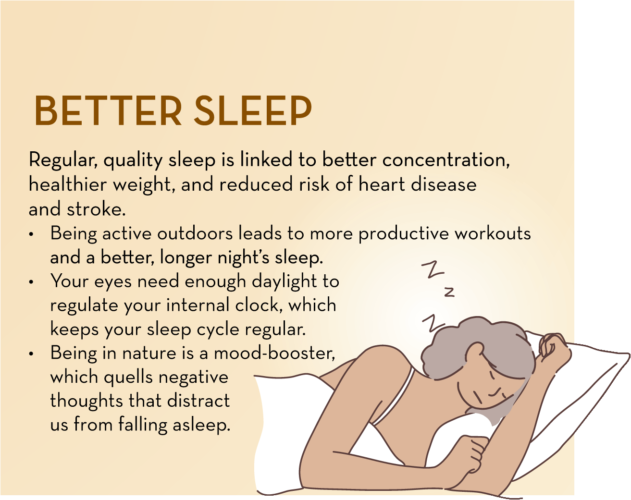
Nature Eases Fears
Time in nature help us learn to cope with and manage our fears because of its unknowns, such as the weather.
“I have to challenge myself with being ok with not knowing,” Hall said. “I can walk a trail and realize the environment has shifted since the last walk. I realize nature is going to shift and be unpredictable and the weather might change. I have to learn to be ok with that, which reduces fear.”
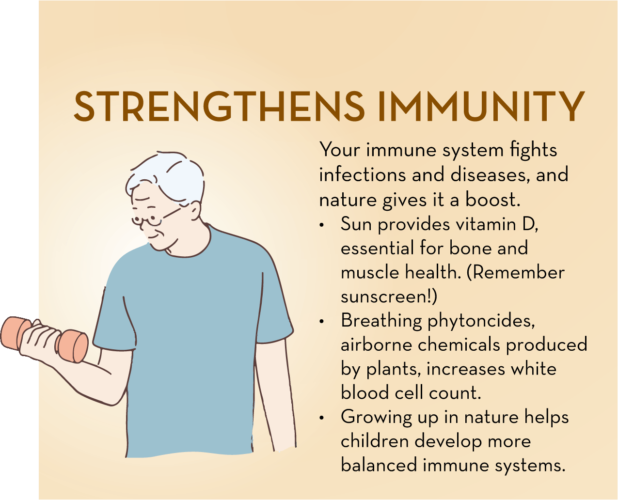
Nature Increases Productivity
“If you know you’re going to be challenged with something, take a minute to walk,” Hall said. “Studies show that if you can walk 15 minutes outside before a test, it will triple your ability to focus and stay cognitively sharp.”
Even a short time in nature will increase blood flow, lower cortisol and allow you to regain your focus. This is true at work as well.
“We find if someone holds a departmental retreat in a conference room, creativity is not expanded because everyone’s in the same space,” Hall said. “It doesn’t promote diversity of thoughts. Nature, on the other hand, gives us inner inspiration not only to think about things from multiple angles but reflect on that. You’ve unlocked your ability to think differently.”
Moving outdoors takes this one step further because the “physical self is invigorated so I’m much more willing to act on what I think about. There’s a high correlation between how the mental and emotional and physical self work in tandem in a very fast way when in nature, and that gets translated into increased productivity.”
Nature Improves Mood
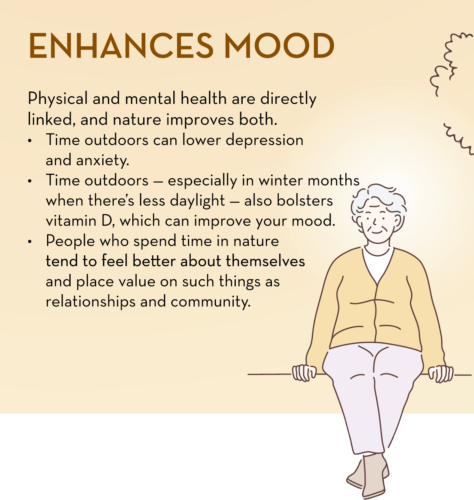
Research shows the bacteria in soil increases serotonin and releasing this bacteria has been found to reduce depression, body-wide inflammation and stress, Hall said. Horticultural therapies, popular after World War II, were onto these benefits and created spaces where healing activities included gardening.
“We do know that fascination short-circuits rumination, preventing us from getting trapped in a cycle and having tunnel vision,” he said. “The anecdote to that is breaking that pattern. When you’re in nature, you shift from different sounds, smells and sights. This creates curiosity, which unlocks fascination and has an immediate positive effect on a depressive state.”
Even things you don’t notice outdoors can improve your mood. For example, petrichor is the pleasant scent produced by negative ions when rain falls on dry soil.
Hall said more people, businesses and organizations are becoming attuned to the many health benefits of time in nature — and recognizing their importance, as well as how easy it is to improve human health simply by stepping outside.
The 19th-century Americans Ralph Waldo Emerson and John Muir built the case for creating the world’s first national parks by claiming that nature has healing powers for both mind and body. There wasn’t hard evidence back then — but there is an abundance of it now.
“Nature by design is our friend,” he said. “I’m excited to see a movement that’s embracing this.”
